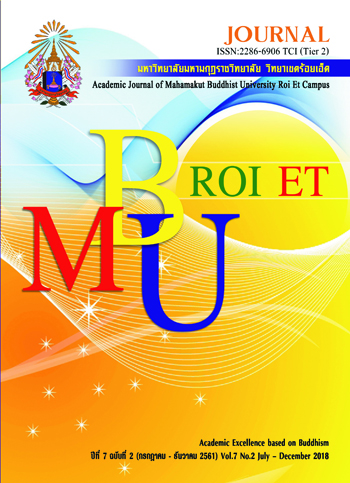Relations Between School Administrators’ competency and Their Administrative Efficiency at Schools under Roi Et Elementary Education Service Area Office 1
Main Article Content
Abstract
The thematic paper served the purposes: 1) to study school administrators’ competency following Teacher Council’s professional standards on their school administrations at schools under Roi Et Elementary Education Service Area Office 1, 2) to scrutinize their efficiency of school administrations at schools under the aforesaid area office, 3) to examine their competency following Teacher Council’s professional standards on their school administrations at the preceding schools under the same area office with their school administrations at schools , 4) to collect suggestions for enhancing their competency and their administrative efficiency. Samples were 317 teachers at the target schools under the above office, setting the sampling groups through R. C. Krejcie’s and D. W. Morgan’s calculation table. The device used for conducting the research was the questionnaire handout with every question in it having the reliability at 0.92. Statistics used for processing data embraced frequencies, percentages, means, standard deviations, t-test (One-way ANOVA), (Pearson’s Simple Correlation).
Results of the research have found the following findings: 1) School administrators’ level as prescribed by Teacher Council’s professional standards on administrations of schools under Roi Et Elementary Education Service Area Office 1 has been rated at the high scale in the overall aspect. When taking each aspect into consideration, eight aspects have been found rating at the high scales, other two aspects at the moderate. First three aspects of school administrations with the highest means in the descending order are: ethics and morality, public relations and community relations, and students’ affairs. Another aspect with the lowest mean is educational assurance. 2) The level of school administrators’ administrative efficiency for administrations of schools under it has been measured at the high scale. The aspect of their administrative efficiency with the highest scale is their adaptive developments of schools while that of theirs with the lowest scale is producing students’ high achievements of learning. 3) The hypothesis testing results have been found that their administrative competency as prescribed by Teacher Council’s professional standards on administrations of schools has positive relations with their administrative competency in the overall aspect and each one, with the statistical significance level at 0.01 4) Respondents’ suggestions for enhancing school administrators’ competency and their administrative efficiency at Roi Et province’s Muang district-located schools under the office mentioned office have been recommended in the descending order of top three frequencies. First, school administrators have planned their work performance of each task to achieve the aims according to practice plans. Next, they must open up opportunities to teachers to express their opinions and urge on school personnel’s career progression. Last, they must have abilities in selecting a method of self-development suitable for either strong or weak points of their own. In addition, they must have a creative method to admire school personnel’s deeds for the sake of their morale and encouragement.
Article Details
References
คณะครุศาสตร์ จุฬาลงกรณ์มหาวิทยาลัย. (2553). การนำแผนยุทธศาสตร์สู่การปฏิบัติ. กรุงเทพฯ : โรงพิมพ์แห่งจุฬาลงกรณ์หาวิทยาลัย.
จันธิดา ผ่านสอน. (2553). ความสัมพันธ์ระหว่างภาวะผู้นำการเปลี่ยนแปลงกับประสิทธิผลในการบริหารของผู้บริหารสถานศึกษาในสังกัดสำนักงานเขตพื้นที่การศึกษาร้อยเอ็ด. วิทยานิพนธ์การศึกษามหาบัณฑิต. บัณฑิตวิทยาลัย : มหาวิยาลัยมหามกุฏราชวิทยาลัย.
ธวัชชัย ยวงคำ. (2552). ความสัมพันธ์ระหว่างคุณลักษณะผู้นำการเปลี่ยนแปลงกับประสิทธิผลของสถานศึกษาขั้นพื้นฐานสังกัดสำนักงานเขตพื้นที่การศึกษาน่าน เขต 2. วิทยานิพนธ์ครุศาสตรมหาบัณฑิต. บัณฑิตวิทยาลัย : มหาวิทยาลัยราชภัฏอุตรดิตถ์.
ธีระ รุญเจริญ. (2556). การบริการโรงเรียนในยุคปฏิรูปการศึกษา. กรุงเทพฯ : ข้าวฟ่าง.
บุญชม ศรีสะอาด. (2545). การวิจัยเบื้องต้น. พิมพ์ครั้งที่ 7. กรุงเทพฯ : สุวีริยาสาส์น.
ปรีชา ทัศน์ละไม. (2549). ความสัมพันธ์แบบภาวะผู้นำของผู้บริหารโรงเรียนและประสิทธิผลของโรงเรียนสังกัดสำนักงานเขตพื้นที่การศึกษาชัยภูมิ เขต 1-3. วิทยานิพนธ์ครุศาสตรมหาบัณฑิต. บัณฑิตวิทยาลัย : มหาวิทยาลัยราชภัฏเลย.
ยิ่งยศ พละเลิศ. (2550). สมรรถนะผู้บริหารโรงเรียน สังกัดสำนักงานเขตพื้นที่การศึกษากาญจนบุรี เขต 3. วิทยานิพนธ์ศึกษาศาสตรมหาบัณฑิต. บัณฑิตวิทยาลัย : มหาวิทยาลัยศิลปากร.
รัชนีกร หงส์พนัส. (2547). การทำนายผลสัมฤทธิ์ทางการเรียนและทัศนคติต่อวิชาชีพครูจากคะแนนแววครูของครุศาสตรบัณฑิต สาขาประถมศึกษาร้อยเอ็ด. กรุงเทพฯ : จุฬาลงกรณมหาวิทยาลัย.
สมหวัง พิธิยานุวัฒน์ และคณะ. (2543). สาระสำคัญของร่างพระราชบัญญัติในส่วนที่เกี่ยวข้องกับใบอนุญาตประกอบวิชาชีพผู้บริหาร. กรุงเทพฯ : สำนักงานคณะกรรมการการศึกษาแห่งชาติ.
สำนักงานคณะกรรมการการศึกษาแห่งชาติ. (2543). ตัวชี้ลักษณะครูที่ดี การจัดการเรียนการสอนที่เน้นผู้เรียนเป็นศูนย์กลาง ลักษณะของผู้บริหารที่สนับสนุน Child-Center. กรุงเทพฯ : คุรุสภาลาดพร้าว.
สำนักงานรับรองมาตรฐานและประเมินคุณภาพการศึกษา (องค์กรมหาชน). (2548). มาตรฐาน ตัวบ่งชี้และเกณฑ์การพิจารณาเพื่อการประเมินคุณภาพภายนอก ระดับการศึกษาขั้นพื้นฐานรอบที่ 2 (พ.ศ. 2548-2553). กรุงเทพฯ : จุดทอง.
สุกัญญา รัศมีธรรมโชติ. (2548). แนวทางการพัฒนาศักยภาพมนุษย์ด้วย Competency based learning. กรุงเทพฯ : สถาบันเพิ่มผลผลิตแห่งชาติ.
สุพจน์ วิเชียรศรี. (2550). ความสัมพันธ์ระหว่างพฤติกรรมการบริหารกับมาตรฐานการบริหารและการจัดการศึกษาของผู้บริหารสถานศึกษาสังกัดสำนักงานเขตพื้นที่การศึกษาสุพรรณบุรี เขต 1. วิทยานิพนธ์ศึกษาศาสตรมหาบัณฑิต. บัณฑิตวิทยาลัย : มหาวิทยาลัยราชภัฏพระนครศรีอยุธยา.
Gibson, C. and D. Mahoney. (1988). Predictor of Job Satis Faction and Organization Commitment Service Organizations. New Jersy : Prentice – Hall.
Hoy, Wayne K. and Cecil G. Miskel. (1991). Educational Administrations : Theory the Research and Practice. 4 ed. Singapore : McGraw-hill.


